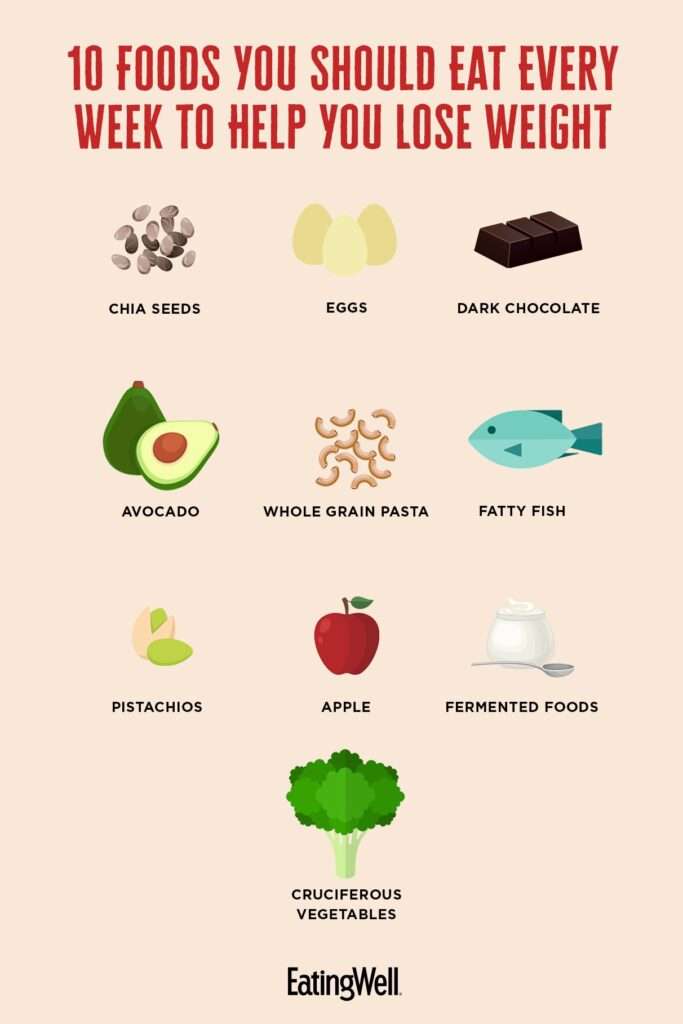Can you really lose weight without having to say goodbye to your favorite foods? It sounds too good to be true, doesn’t it? Well, I’m here to tell you that it’s actually possible. Many people believe that in order to shed those unwanted pounds, you have to completely eliminate certain food groups from your diet. But the truth is, you don’t have to go to such extremes to achieve your weight loss goals. In this article, we’ll delve into the topic further and explore different strategies that allow you to lose weight while still enjoying a diverse range of foods.
When it comes to weight loss, the key is to create a calorie deficit – consuming fewer calories than your body needs. This can be achieved through various methods, such as portion control, mindful eating, and incorporating regular exercise into your routine. It’s important to note that no single food group is solely responsible for weight gain. The real culprit is often overconsumption of calories, regardless of their source. So instead of completely avoiding certain food groups, it’s more about making healthier choices within those groups.
For example, if carbohydrates are your weakness, you don’t have to completely eliminate them from your diet. Instead, focus on opting for whole grain options, such as brown rice or whole wheat bread, which offer more nutritional value and fiber compared to their refined counterparts. Similarly, if you’re a fan of high-fat foods, try choosing healthier sources of fat like avocados, nuts, and seeds, which provide essential nutrients and can actually support weight loss. In this way, you can still enjoy the foods you love while making smarter choices that promote a healthier lifestyle.
So, if you’ve been wondering whether you can lose weight without sacrificing your favorite food groups, the answer is yes! By making small, sustainable changes to your eating habits and incorporating regular exercise, you can achieve your weight loss goals without feeling deprived. In the following article, we’ll explore these strategies in more detail and provide tips on how to navigate different food groups while still enjoying the foods you love. Stay tuned for more valuable information on this topic!

Benefits of including all food groups for weight loss
Losing weight is a common goal for many individuals, but it can often be accompanied by feelings of restriction and deprivation. One common misconception is that in order to shed pounds, certain food groups must be completely eliminated from your diet. However, this approach may not only be unsustainable in the long run but can also have negative effects on your overall health. In this article, we will explore the benefits of including all food groups for weight loss, and discuss how a balanced approach to nutrition can lead to sustainable and long-term results.
Weight loss through balanced nutrition
The key to successful weight loss lies in fueling your body with the right nutrients. Instead of eliminating entire food groups, focusing on a balanced and varied diet can provide you with the necessary energy and nutrients to support your weight loss journey. Each food group plays a vital role in providing your body with the fuel it needs to function optimally.
Improved metabolism
Including all food groups in your diet can help to improve your metabolism. When you eat a variety of foods, your body is provided with a range of nutrients that it needs to carry out its metabolic processes. This can help to boost your metabolism, leading to more efficient calorie burning and improved weight loss.
Sustainable long-term results
Cutting out specific food groups for weight loss may yield short-term results, but it often leads to feelings of deprivation and ultimately makes it difficult to maintain a healthy lifestyle in the long run. By including all food groups, you can create a sustainable eating plan that is balanced and enjoyable. This allows you to not only achieve your weight loss goals but also maintain them over time.
Understanding food groups and their importance
In order to incorporate all food groups into your diet for weight loss, it’s important to understand the unique roles that each group plays in your overall nutrition.
Carbohydrates: Fuel for energy
Carbohydrates are your body’s main source of energy. They provide fuel for your brain, muscles, and other organs to function properly. Including healthy sources of carbohydrates, such as whole grains, fruits, and vegetables, in your diet can help to provide sustained energy throughout the day, without causing dramatic fluctuations in blood sugar levels.
Proteins: Building blocks for muscle growth
Proteins are crucial for the growth and repair of tissues in your body, including muscles. By including sources of lean protein, such as chicken, fish, tofu, and legumes, in your diet, you can help to build and maintain muscle mass. This can be important for weight loss, as muscle burns more calories than fat, even at rest.
Fats: Essential for hormone production
Contrary to popular belief, fats are an essential part of a healthy diet. They provide your body with essential fatty acids, which are important for brain function, hormone production, and the absorption of fat-soluble vitamins. Including healthy sources of fats, such as avocados, nuts, seeds, and olive oil, can help to keep you feeling satisfied and help regulate your hormones.
Fruits and vegetables: Rich in vitamins and minerals
Fruits and vegetables are packed with essential vitamins, minerals, and antioxidants that are crucial for optimal health. They are low in calories and high in fiber, making them an excellent choice for weight loss. By incorporating a variety of colorful fruits and vegetables into your meals, you can ensure that you are getting a wide range of nutrients that support weight loss and overall well-being.
Dairy: Calcium for bone health
Dairy products, such as milk, cheese, and yogurt, are excellent sources of calcium. Calcium is important for maintaining strong and healthy bones. Including dairy products in your diet can help to prevent bone loss and reduce the risk of osteoporosis. If you are lactose intolerant or prefer non-dairy options, there are plenty of alternatives available such as fortified plant-based milks and calcium-rich foods like leafy greens and tofu.

Balanced meal planning for weight loss
Now that we understand the importance of including all food groups, let’s explore some practical tips for incorporating them into your daily meals for effective weight loss.
Portion control and moderation
Portion control is essential when it comes to weight loss. Even healthy foods can contribute to weight gain if consumed in excessive amounts. Use measuring cups or a food scale to ensure you are consuming appropriate portion sizes. Additionally, practicing moderation is key. Allow yourself to enjoy all food groups in moderation, without overindulging or restricting yourself.
Incorporating a variety of food groups
When planning your meals, aim to include a variety of food groups. This ensures that you are getting a wide range of nutrients to support optimal health and weight loss. Create a colorful plate by including different fruits and vegetables, whole grains, lean proteins, and healthy fats.
Meal prep and planning
Meal prepping and planning can be a game-changer when it comes to weight loss. By preparing your meals in advance, you can ensure that you have healthy options readily available and avoid making impulsive choices that may not align with your weight loss goals. Dedicate some time each week to plan and prepare your meals, taking into consideration all food groups.
Tracking calorie intake
Tracking your calorie intake can be a helpful tool for weight loss. While it’s not necessary to obsessively count calories, keeping a rough estimate of your daily intake can give you a better understanding of your energy balance and help you make more informed choices. There are several apps and websites available that can assist you in tracking your calorie intake.
The myth of cutting out food groups for weight loss
It’s time to dispel the myth that cutting out entire food groups is necessary for weight loss. In reality, this approach can have negative consequences both physically and emotionally.
Short-term weight loss vs. long-term sustainability
Cutting out food groups may lead to rapid weight loss initially, but it often comes at the expense of long-term sustainability. In order to ensure that you are able to maintain a healthy weight and lifestyle, it’s important to adopt an eating plan that includes all food groups. This will not only provide you with the necessary nutrients but also help to create a positive and balanced relationship with food.
Negative impact on overall nutritional intake
Eliminating entire food groups can lead to inadequate intake of certain nutrients, which can have a negative impact on your overall health. Each food group offers unique benefits and contributes to your overall nutrition. By cutting out specific groups, you may miss out on important vitamins, minerals, and other essential nutrients that your body needs.
Potential deficiencies in essential nutrients
When you exclude certain food groups, you run the risk of developing deficiencies in essential nutrients. For example, eliminating dairy products may lead to inadequate calcium intake, which can increase the risk of bone-related issues. By including all food groups, you can ensure that you are getting a wide range of nutrients and reduce the likelihood of developing deficiencies.
Psychological and emotional effects
Restricting yourself from certain food groups can have negative psychological and emotional effects. It can lead to feelings of deprivation, guilt, and anxiety around food. This can create an unhealthy relationship with food and may even contribute to disordered eating habits. By including all food groups in your diet, you can enjoy a balanced and varied eating plan, fostering a positive and sustainable relationship with food.

Finding the right balance for weight loss
Finding the right balance when it comes to weight loss is essential for success. It’s important to identify and address any problem areas and develop strategies to overcome them.
Identifying and addressing problem areas
Take the time to reflect on your current eating habits and identify any problem areas that may be hindering your weight loss progress. Are there certain food groups that you tend to overindulge in? Are there any food groups that you typically avoid? Once you have identified these areas, you can work on developing strategies to address them.
Consulting with a registered dietitian
If you are unsure about how to incorporate all food groups into your diet for weight loss, it may be helpful to consult with a registered dietitian. They can provide personalized guidance and tailor a meal plan to suit your individual needs and preferences. A dietitian can also help you address any specific concerns or challenges you may have, such as food allergies or intolerances.
Modifying portion sizes and food choices
In some cases, modifying portion sizes or food choices within each food group may be necessary for weight loss. For example, opting for lean sources of protein and reducing portion sizes of carbohydrates can help to create a calorie deficit and support weight loss. However, remember that it’s important to maintain a balanced approach and not eliminate entire food groups.
Building a healthy relationship with food
Developing a healthy relationship with food is crucial for long-term success and overall well-being. Here are a few strategies to foster a positive relationship with food.
Mindful eating and listening to hunger cues
Practicing mindful eating involves paying attention to your body’s hunger and fullness cues and eating with intention and awareness. By tuning in to your body’s natural signals, you can better understand when you are truly hungry and when you are satisfied. This can help prevent overeating and encourage a healthier relationship with food.
Enjoying a variety of foods in moderation
There is no need to completely eliminate your favorite foods or treats from your diet. Instead, enjoy them in moderation and savor each bite. Allowing yourself to indulge occasionally can help to prevent feelings of deprivation and increase overall satisfaction with your eating plan.
Finding alternative options within food groups
If you have specific dietary restrictions or preferences, it’s important to find alternative options within each food group to ensure that you are getting the necessary nutrients. For example, if you are lactose intolerant, there are plenty of non-dairy alternatives available that can provide you with the same benefits as dairy products.

Incorporating exercise for effective weight loss
While nutrition plays a primary role in weight loss, incorporating regular exercise can enhance your results and improve overall health. Here are a few tips for integrating exercise into your weight loss journey.
Combining exercise and balanced nutrition
To achieve optimal weight loss results, it’s important to combine regular exercise with a balanced diet. Exercise not only burns calories but also helps to build lean muscle mass, which can increase your metabolism and support long-term weight maintenance. Aim for a combination of cardiovascular exercise, strength training, and flexibility exercises to achieve a well-rounded routine.
Finding activities that suit personal preferences
The key to sticking with an exercise routine is finding activities that you enjoy. Experiment with different forms of exercise, such as walking, jogging, cycling, swimming, or group fitness classes, until you find something that you look forward to. This will increase your motivation and make it more likely that you will stick with your exercise plan.
Creating a sustainable workout routine
Consistency is key when it comes to exercise. Aim for at least 150 minutes of moderate-intensity aerobic activity per week, along with two or more days of strength training exercises. Remember to start at a level that is appropriate for your fitness level and gradually increase the duration and intensity of your workouts to avoid injury.
Tracking progress and making adjustments
Tracking your progress is important for staying on track and making adjustments along the way. Here are a few strategies to help you stay accountable and evaluate your progress.
Keeping a food and exercise journal
Keeping a journal can be a useful tool for tracking your food intake and exercise habits. This can help you identify patterns, track your progress, and make adjustments as needed. You can also note how different food groups make you feel and which ones you find most satisfying, allowing you to fine-tune your eating plan.
Evaluating progress and adjusting goals
Regularly evaluating your progress is important to ensure that you are on track to meet your weight loss goals. Take the time to assess how your eating and exercise habits are contributing to your progress. If necessary, make adjustments to your routine, whether it’s modifying portion sizes, increasing exercise intensity, or seeking additional support.
Seeking support and accountability
Seeking support from friends, family, or online communities can provide valuable accountability and encouragement on your weight loss journey. Sharing your goals and progress with others can help you stay motivated and make healthier choices. Consider joining a weight loss support group or finding a workout buddy to help keep you accountable.
Importance of patience and consistency
It’s important to remember that weight loss is a gradual process that requires patience and consistency. Here are a few key points to keep in mind throughout your journey.
Weight loss as a gradual process
Weight loss is not an overnight process. It takes time, effort, and consistency to achieve lasting results. Aim for a gradual weight loss of 1-2 pounds per week, as this is considered a healthy and sustainable rate.
Maintaining healthy habits for long-term success
Weight loss is not just about reaching a specific number on the scale. It’s about adopting healthy habits that you can maintain for life. Focus on incorporating balanced nutrition, regular exercise, and mindful eating into your daily routine. By maintaining these habits, you can achieve long-term success and overall well-being.
Conclusion
In conclusion, losing weight without giving up certain food groups is not only possible but also beneficial for your overall health and well-being. By including a variety of foods from all food groups and focusing on balanced nutrition, portion control, and mindful eating, you can achieve sustainable weight loss and maintain a healthy lifestyle. Remember to find the right balance, seek support when needed, and be patient with yourself as you embark on this journey. With consistency and determination, you can achieve your weight loss goals and enjoy a lifetime of good health.
